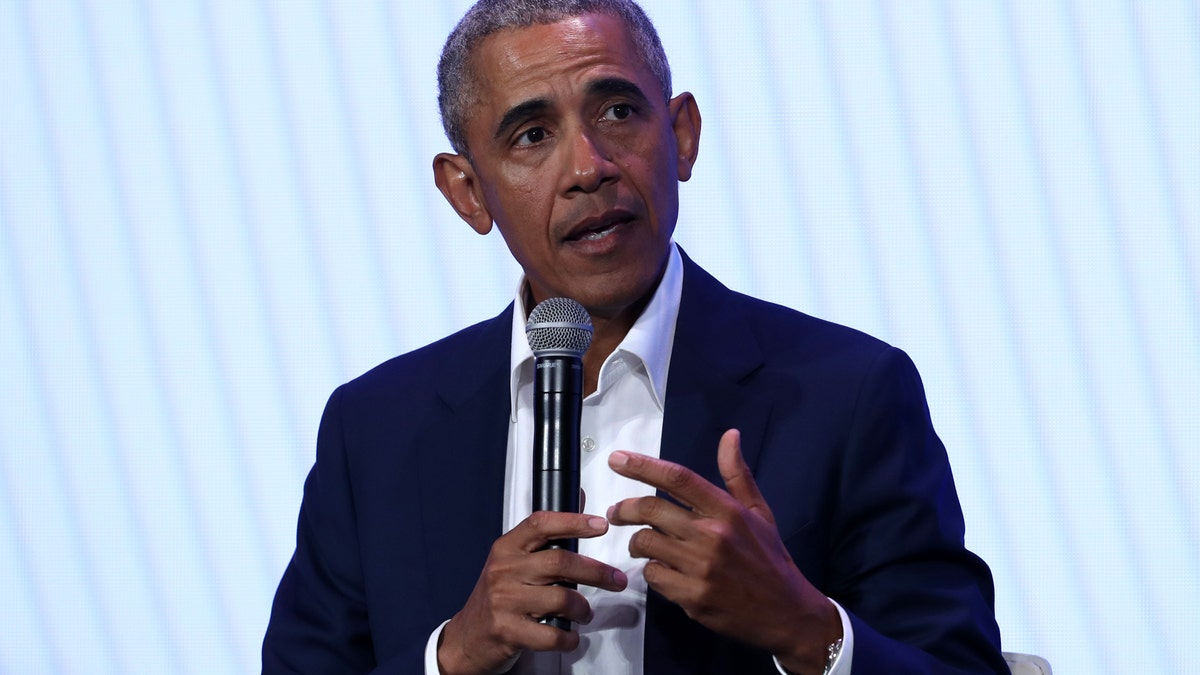
Former President Barack Obama speaks during the MBK Rising! My Brother’s Keeper Alliance Summit Tuesday in Oakland, California. (Justin Sullivan/Getty Images)
President Obama sounded like a conservative Tuesday at the My Brother's Keeper Alliance Summitt in Oakland, Calif., when he addressed hundreds of young men of color alongside basketball superstar Steph Curry.
Obama talked to the young men about the virtues of monogamy. He shared his personal experiences growing up without a dad. He also offered a helpful, traditional, definition of manhood: “being responsible, working hard, being kind, respectful, compassionate.”
When identifying where messages that run contrary to his own come from, Obama decried hip-hop's negative influence.
BARACK OBAMA SLAMS POP CULTURE FOR FOISTING BAD VALUES ON YOUNG MEN
“A lot of hip-hop and rap music is built around me showing how I got more money than you, I can disrespect you and you can’t do nothing about it, I’m going to talk about you and punk you,” Obama said. In addition, he criticized the objectification of women and sexual immorality promoted by hip-hop.
I grew up influenced by hip-hop in many of the negative ways that the former president described. But I learned to make excuses for myself because I embraced a certain moral relativism, telling myself that it was OK for me to hurt myself and others because of how unfair the world was to me.
In the worldview promoted by both hip-hop and today's Democratic politics, it's as if young men of color are morally irrelevant because we are simply passengers on a train controlled by others, with no say in where we are going.
I learned this way of thinking in large part through the 1990s rappers I listened to on my CD player and watched on television. Their collective philosophy of avoiding personal responsibility was alluring to a young man angry with the world.
Years of thinking of myself as a powerless victim of an unjust world went by before I had people in my life speak to me in the way Obama spoke to those young men in Oakland: as an iconoclast knocking down false idols.
Young men in the Obama’s audience were lucky to hear that message earlier in life than I did.
There are deep roots to Obama’s vision for what a better America for young men of color looks like. With his My Brother's Keeper initiative, the former president is participating in a long and storied African-American political tradition of reminding young men that a strong moral compass makes a difference.
This tradition is present in different approaches to black political leadership – from Booker T. Washington to Marcus Garvey to Martin Luther King Jr. In this tradition, it's imperative that all people regardless of race or class turn inward when thinking about how to make the world a better place, rather than narrowly focusing on what others are doing to them or for them.
Obama occasionally invoked this political tradition when he was president, such as in his 2013 commencement address at Morehouse College. So the truth is, he hasn't changed all that much since leaving the White House.
But as president, Obama rarely criticized hip-hop’s cultural influence. Instead, he invited rappers to the White House and publicly befriended Jay-Z and Beyonce.
Obama’s mixed messages may give his criticisms today more credibility with young men who need to hear them, but his past reliance on the star power of rappers might also explain why other Democrats so rarely criticize hip-hop and its influence on young men.
Indeed, the aversion of today’s Democratic leaders to talking about culture and family is bigger than hip-hop. Democrats today seem to have no interest in encouraging young men of color to turn inward – only outward.
The Democratic Party is narrowly focused on articulating an urgent need for the U.S. government to save the American people with big, sweeping actions like the Green New Deal.
And Democrats criticize their own, such as Democratic presidential candidate Sen. Bernie Sanders, I-Vt., for suggesting that what a candidate believes matters far more than that candidate's race, gender or sexual orientation. Any attempt to discuss culture and family is dismissed in favor of discussing racism.
Inconsistent with Obama’s call to action in Oakland, today’s Democratic leaders appear to define young men of color by what others – rich people, white people, privileged classes – do to us and for us.
This is why it's easier to find Democratic presidential candidates on record being fooled by what police say was the staged assault of actor Jussie Smollett than it is to find the candidates talking about far more common forms of violence – like gang violence, where young men of color are not just victims but also perpetrators.
CLICK HERE TO GET THE FOX NEWS APP
In the worldview promoted by both hip-hop and today's Democratic politics, it's as if young men of color are morally irrelevant because we are simply passengers on a train controlled by others, with no say in where we are going.
But that’s simply untrue. We need people to remind us of the moral agency each individual possesses. Obama provided such a reminder this week. Hopefully he stays on message.
